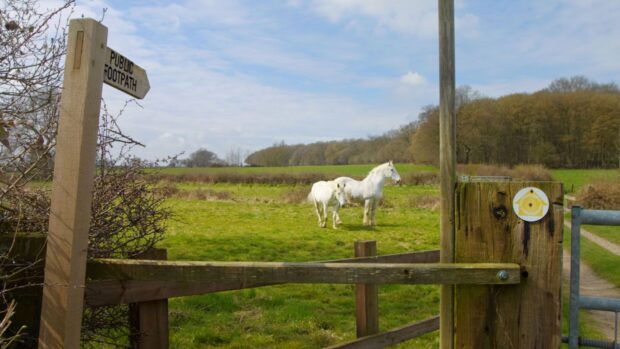My yard owner has agreed to invest in some kind of field/manure cleaner. How efficient are they and can people of any age drive them on private land?
Opinion is divided regarding the efficiency of these machines. Common criticisms are that they are impractical — as the operator may need to keep getting off the tractor or quad bike towing the machine to operate the suction hose — and expensive because they consume a fair amount of fuel and cost between £2,000-£5,000 to buy.
“Unless you have a large number of horses turned out 24/7, I’d stick to the wheelbarrow and make the most of the opportunity to bond with the horses in the field,” advises one H&H forum user.
However, Anna Eltsina from Richmond, who has livestock on her land and keeps three horses at livery, is a big fan of suction paddock cleaners.
“As I have a bad back and find it difficult to bend down to muck out and clean the fields, a few years ago I bought a simple model, which is pulled by a tractor,” she says. “Mine is powered by a two-stroke petrol engine and has a light pick-up hose. It was £2,000 well spent and makes mucking out a breeze.”
The suction in paddock cleaners has increased over the years — current models use heavy-duty internal fans, which produce a strong airflow. In general, cleaners are now stronger and easier to use, and many machines are hydraulically tipped to empty, meaning they are great for people with limited mobility or bad backs.
There is often no minimum age recommended for using paddock cleaners, or the vehicles that tow them, on private land, but parents and yard owners should exercise their judgement regarding young people using such equipment.
Insurance cover, including public liability, is required if such machinery is to be used by liveries, according to Jeremy Lawton of Shearwater Insurance Services Ltd.
“The yard owner could be liable if an accident occurs and in this case, would be responsible for providing cover. The yard owner should contact their insurer to find out the specific requirements,” he explains.
“If the vehicle is to go on the road at any point, it would need to have its own insurance,” he adds. “Should the driver of the machine have their own personal accident policy — again depending on the insurer — they would be covered under the terms of that policy.”
Michael George Prigg, managing director of Terra Vac, which manufactures paddock cleaners, acknowledges that suction cleaners are sometimes perceived to be expensive to run, but points out that petrol-driven models cost from £2.37 per hour, while diesel and PTO driven models (those using power take-off, a device that transfers power from the engine) cost from just 46p per hour.
For more information
- Shearwater Insurance Services Ltd (tel: 08700 767666) www.shearwater-insurance.co.uk
- Terra Vac (tel: 01440 712171) www.terra-vac.com
This Q&A feature was first published in Horse & Hound (19 July, ’07)



